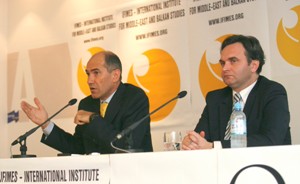Today the Prime Minister of the Republic of Slovenia and current President of the European Council, Mr Janez Janša, discussed the key challenges ahead of the European Union in the twenty-first century at a meeting organised by the IFIMES - The International Institute for Middle East and Balkan Studies, the Slovenian Government Communication Office and Center Evropa (the Information Centre of the Delegation of the European Commission in Slovenia).

(Photo:Bor Slana/Bobo)
The Prime Minister opened by emphasising that the challenges facing Europe in the twenty-first century were just as predictable as those of the 1990s. In the course of its operation, however, the European Union has learned important lessons and has therefore become more determined with respect to the implementation of the measures it has adopted. According to the Prime Minister, consensus between individual Member States is reached faster now. For the first time in the modern era, Europe will define its own national European interest based on the ideas enshrined in the Treaty of Rome.

(Photo: Bor Slana/Bobo)
The Slovenian Prime Minister observed that the key challenges ahead of the European Union in the twenty-first century were world peace and security, climate change and the fight against poverty, these being also the principal global challenges. He went on to add that there was not one of the three key challenges that could be addressed by any single global player acting alone, since causes and consequences were inextricably intertwined and interlinked. “Thanks to its specific nature, essence and origin, the European Union has a unique role and must assume a leadership role in addressing these challenges. Responses to those challenges are indispensable to the future prosperity of Europeans,” stressed the Prime Minister, pointing out that the key challenges lay outside the European Union, not within its borders “It is high time we began deliberating on the Treaties of Rome in transcontinental terms,” said the Slovenian Prime Minister, stating the reasons why the European Union should take the lead in the global political arena.
European Council President Janez Janša noted that, on the path to achieving the set objectives of the European Union and to turning outwards and facing global challenges, the main barriers were actually in European citizens themselves. In his opinion, the majority of the European public at this stage is not ready, in particular on account of its fear of the necessary yet urgently needed reforms, to accept most of the European Union’s attention, activities and money being devoted to addressing global challenges.

(Photo:Bor Slana/Bobo)
In connection with reforms, the Prime Minister referred to the ratification of the Lisbon Treaty, which is the final major prerequisite for the EU-27 to turn outwards and assume the leading role in addressing global challenges. The Lisbon Treaty provides for new institutions and new responsibilities within the European Union, which will be highly symbolic and will help build the overall European identity of EU residents.